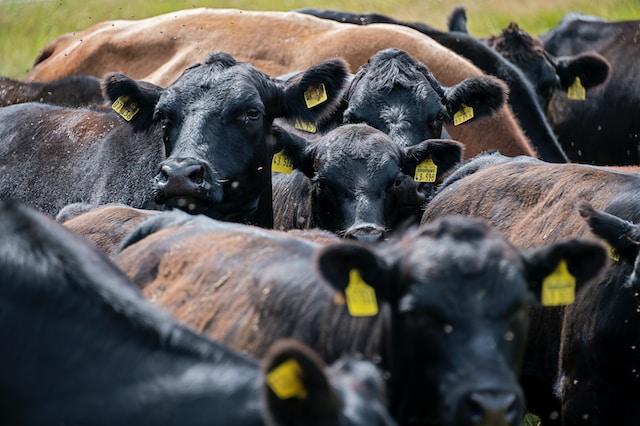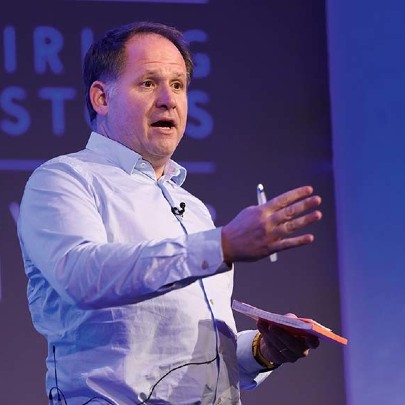July 17, 2023
On 23 May, The Bread & Jam Future Summit 2023, powered by GS1 UK, brought together some of the best and brightest minds from across the food and drink industry.
This included Henry Dimbleby MBE, co-founder of Leon Restaurants, the Sustainable Restaurant Association and former lead non-executive board member of the Department for Environment, Food and Rural Affairs (DEFRA), who took to the stage to explore how the food and drink industry can help protect the planet.
Having spent the last two decades working within the food system, Henry understands the difficulties of operating businesses that not only want to be profitable but also make the world a better place. His insightful talk provided a snapshot of what is currently going wrong within the food system, how we can fix it and what brands need to consider when building a more sustainable business. We have summarised some of the key takeaways below.

Understanding the challenge
Henry believes the best way to change a complex system is through effective government policy combined with community action. However, this can only be achieved if you have a full understanding of the problem you are trying to solve.
While authoring the National Food Strategy, he came to realise that much of what people believe about how the food system actually works was wrong.
To address this, he decided to tell the story behind it in full, going all the way back to 1945 when the entire population of earth was less 2.5 billion.
The scientists of the day had accurately projected that the global population would rise to eight billion over the next 50 years. Arable land was already running out which meant that new, more efficient methods of food production would need to be developed.
Thankfully, a botanist named Norman Bullock began breeding new, tougher strains of wheat that could produce far greater yields than ever before.
Thanks to Norman’s incredible innovation, we now farm slightly less land than we did in 1945 but are providing twice the number of calories.

The impact of food production
However, focusing on solving one problem can often lead to new challenges and, while the amount of land required to produce our food has decreased, food production has come to completely dominate the environment.
Biodiversity collapse is accelerating at an alarming rate. With the combined weight of the eighty billion animals we slaughter each year being 20 times greater than all those in the wild, food production is the biggest cause of biodiversity loss, the largest cause of deforestation, water pollution, water scarcity and the collapse of aquatic life.
After energy, it is also the second biggest cause of climate change, creating between 20 to 30 per cent of all greenhouse gasses annually.
The put it bluntly, the way we produce our food today is threatening our ability to produce it tomorrow, risking starvation, mass migration, and war.
Henry believes there is still room for hope. We know there are problems in the food system and many of them can be resolved with focus and collaboration.
What is going wrong?
If you want to change a system, you first need to work out what is going wrong. According to Henry, there are two feedback loops in the food system that urgently need addressing.
The first is what we call the junk food cycle. Most people think that we are getting unhealthier due to a lack of education and exercise, but this is not the case. Survey after survey has shown that people know what they should be eating and, while exercise is important, it is not always the most effective to lose weight as our bodies naturally resist it. We are getting unhealthier is because our appetites evolved in a world where calories were scarce so the dopamine responses that we get from eating calorie dense food high in fat and sugar are extraordinary.

As a result, the food industry spends a great deal of money creating and marketing these products. If you look at the portfolios of the top seven processed food companies, 85 per cent of the products they sell are deemed too unhealthy to market to children by the World Health Organization. In the UK alone, roughly £3.9 billion of confectionery is sold each a year, compared to £2.2 billion of fruit and veg. Unhealthy food has completely overwhelmed the food system.
The other feedback loop is what some refer to as “the Invisibility of Nature.” Nature is hard to measure. It is silent, invisible and mobile.
It doesn't stay still to be counted and moves across borders without asking permission. It is also invisible in the way we measure human success.
You cannot count nature in your wallet. You cannot see it on the balance sheet of companies. It is not included in GDP. We don't give it a cost. In fact, we give it a negative cost. Governments around the world fund activities that destroy nature to the tune of around $500 billion a year, largely in subsidies to industrial agriculture, fisheries and fossil fuels. We are not just taking nature as a free resource; we are paying people to destroy it.
Reducing harm
Henry explained that if we are to reduce the harm caused by farming, we need to start thinking about land not only in terms of produce yields and calories, but also in terms of restoring biodiversity. This means finding a way to produce enough calories AND sequester carbon.

This is an equation we can actually solve by not being so wasteful. We currently throw away a quarter of the food we grow, 85 per cent of farmland is used for livestock which is an incredibly inefficient way to eat. Twenty percent of our land produces just per cent of our calories so reducing the amount of meat we ate by 30 per cent, would have a completely transformational effect.
Henry says that we need to initiate a long-term culture shift. We need clear targets to increase fruit and veg consumption backed by policies and strategic objectives and need to start paying farmers to make the best use of land.
The role of brands
He again stressed the importance of understanding the problem before attempting to solve it and recommended that brands take a holistic view of their business and its impact.
Collaboration is also key. Businesses need to find the right partners, retailers and consumers and bring them on the journey. To get others invested, they need to have a clear and compelling sense of purpose. They need to effectively communicate the scale of the problem they are trying to solve, how they are solving it and the impact this is having.
GS1 standards have a vital role to play in facilitating this by allowing accurate data to be easily captured shared across the supply chain. This allows businesses to accurately measure their impact, identify key areas for improvement and make more informed, sustainable decisions when it comes to reducing the impact of their processes and sourcing.




